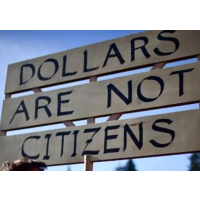State Supreme Court Kicks Anti-Citizens United Measure off the Ballot

California voters didn’t have a say when the U.S. Supreme Court opened the floodgates in its 2010 Citizens United ruling to all manner of untraceable campaign contributions in elections, and now the state Supreme Court has ruled that they won’t get a chance to comment on it either.
In a 5-1 decision (pdf), the California justices effectively removed Proposition 49 from the November ballot, ruling that the courts needed to decide first whether purely advisory measures belong there.
The majority opinion, a scant two paragraphs long, expressed no final view on the matter, but worried that some voters would be confused and others would be frustrated to find the measure on their ballots. The opinion did not say what the confused and frustrated voters might inadvertently do in the voting booth as a result.
Justice Goodwin Liu, in a concurring opinion, did not mince any words: “Our [state] constitution makes no provision for advisory questions, because such polling of the electorate by the Legislature is in tension with the basic purpose of representative as opposed to direct democracy.”
A form of that argument has been used by people who don’t like ballot initiatives at all, but the validity of that form of direct democracy hasn’t been seriously challenged in a hundred years.
Proposition 49 was headed for the ballot after the Legislature approved it and Governor Jerry Brown signed it. The measure’s sponsor, Senator Ted Lieu (D-Torrance), was optimistic that the courts would eventually approve of voters weighing in on advisory matters and predicted it would be on the ballot in 2016.
The proposal was challenged by the conservative Howard Jarvis Taxpayers Association. The organization’s president, Jon Coupal, said the measure was a glorified public opinion poll and had no place in the electoral process. “In an era where voter turnout in California is at an all-time low, why would we want to do something that fosters the notion that votes are meaningless?” he asked.
Coupal’s concern about voter turnout extended beyond worry that the electoral process would be degraded by the measure’s inclusion. Opponents of the ballot measure, many of the Republican persuasion, were afraid that opposition to Citizens United would bring out Democratic voters in a traditionally low-turnout midterm election. Citizens United struck down federal laws that limit spending by corporations and labor unions on political causes, saying they had the same free speech rights as people, and they spoke with their money.
Both sides argued that precedent was on their side. The sole dissenter, Chief Justice Tani Gorre Cantil-Sakauye, cited an 1892 case where the state high court allowed a ballot measure that asked how Californians felt about the federal government’s decision to allow direct election of U.S. senators. Justice Liu and the majority opinion both cited a 1984 high court ruling that removed a ballot measure that would have asked Congress to draft a balanced budget amendment.
Derek Cressman told the San Francisco Chronicle that the court was motivated by a desire to protect judges from second-guessing by the electorate and had “canceled an election that (was) meant to check and balance the judicial branch. . . . It's pretty chilling.”
–Ken Broder
To Learn More:
State Supreme Court Yanks Citizens United Measure from Ballot (by Bob Egelko, San Francisco Chronicle)
California High Court Strikes Measure from Ballot (by Paul Elias, Associated Press)
California Campaign Finance Measure Booted Off Ballot (by Christopher Cadelago and Jim Miller, Sacramento Bee)
California Supreme Court Blocks Citizens United Measure from Ballot (by Melanie Mason, Los Angeles Times)
"Citizens United" Measure Removed from California’s Fall Ballot (by John Myers, KQED)
Anti-Citizens United Measure Kicked Off California Ballot (by Mollie Reilly, Huffington Post)
Howard Jarvis Taxpayers Association et al v. Debra Bowen as Secretary of State (California State Supreme Court) (pdf)
- Top Stories
- Controversies
- Where is the Money Going?
- California and the Nation
- Appointments and Resignations
- Unusual News
- Latest News
- California Forbids U.S. Immigration Agents from Pretending to be Police
- California Lawmakers Urged to Strip “Self-Dealing” Tax Board of Its Duties
- Big Oil’s Grip on California
- Santa Cruz Police See Homeland Security Betrayal in Use of Gang Roundup as Cover for Immigration Raid
- Oil Companies Face Deadline to Stop Polluting California Groundwater





